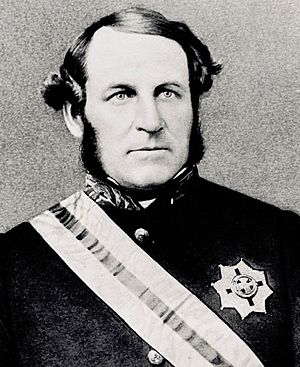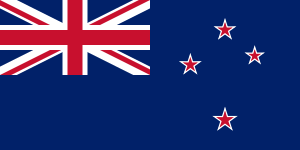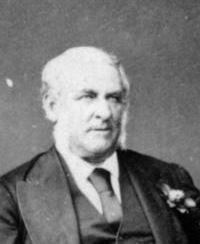George Bowen facts for kids
Quick facts for kids
Sir George Bowen
|
|||||||||
|---|---|---|---|---|---|---|---|---|---|
 |
|||||||||
| 1st Governor of Queensland | |||||||||
| In office 10 December 1859 – 4 January 1868 |
|||||||||
| Monarch | Victoria | ||||||||
| Preceded by | Office Established | ||||||||
| Succeeded by | Samuel Blackall | ||||||||
| 5th Governor of New Zealand | |||||||||
| In office 5 February 1868 – 19 March 1873 |
|||||||||
| Monarch | Victoria | ||||||||
| Premier | Edward Stafford William Fox George Waterhouse |
||||||||
| Preceded by | Sir George Grey | ||||||||
| Succeeded by | Sir James Fergusson | ||||||||
| 5th Governor of Victoria | |||||||||
| In office 30 July 1873 – 22 February 1879 |
|||||||||
| Monarch | Victoria | ||||||||
| Preceded by | Sir John Manners-Sutton | ||||||||
| Succeeded by | The 2nd Marquess of Normanby | ||||||||
| 13th Governor of Mauritius | |||||||||
| In office 1879–1883 |
|||||||||
| Monarch | Victoria | ||||||||
| 9th Governor of Hong Kong | |||||||||
| In office 30 March 1883 – 6 October 1887 |
|||||||||
| Monarch | Victoria | ||||||||
| Lieutenant Governor | LTG John Sargent LTG Sir William Cameron |
||||||||
| Colonial Secretary | William Henry Marsh Frederick Stewart |
||||||||
| Preceded by | Sir John Pope Hennessy | ||||||||
| Succeeded by | Sir George William Des Vœux | ||||||||
| Personal details | |||||||||
| Born | 2 November 1821 Parish of Taughboyne, County Donegal, Ulster, Ireland |
||||||||
| Died | 21 February 1899 (aged 77) Brighton, England |
||||||||
| Resting place | Kensal Green Cemetery | ||||||||
| Nationality | British | ||||||||
| Spouses |
Diamantina di Roma
(m. 1856; died 1893)Letitia Florence White
(m. 1896) |
||||||||
| Alma mater | Trinity College, Oxford | ||||||||
| Profession | colonial administrator | ||||||||
| Chinese name | |||||||||
| Traditional Chinese | 寶雲 | ||||||||
| Simplified Chinese | 宝云 | ||||||||
|
|||||||||
Sir George Ferguson Bowen (Chinese: 寶雲; born November 2, 1821 – died February 21, 1899) was an Irish author and a colonial administrator. This means he was a British official who helped govern colonies around the world. He served in many places, including the Ionian Islands, Queensland, New Zealand, Victoria, Mauritius, and Hong Kong.
Contents
Early Life and Education
George Bowen was born in a place called Taughboyne in County Donegal, Ireland. His father, Edward Bowen, was a church leader there. George likely grew up in a house called Bogay House.
He went to school at Charterhouse School and then to Trinity College, Oxford. He studied classics and did very well, earning a Bachelor of Arts degree in 1844. He was also the president of the Oxford Union twice, which is a debating society at Oxford University.
Service in the Ionian Islands
In 1847, George Bowen became the president of the Ionian Academy in Corfu. This was an important educational role.
Later, in 1854, he became the chief secretary for the government of the Ionian Islands. While working there, he married Diamantina di Roma in 1856. Her father was a local leader, the President of the Ionian Senate. Bowen was recognized for his work and received an honor called the Companion of the Order of St Michael and St George (CMG) in 1855.
Governor of Queensland
In 1859, George Bowen was chosen to be the very first Governor of Queensland. Queensland had just become a separate colony from New South Wales in Australia. He started his role on December 10, 1859, and stayed until 1868.
He had a big impact in Queensland. He was interested in exploring the area and setting up a volunteer army. Even though he faced some challenges, like a financial crisis in 1866, he was quite popular. People in Queensland even asked him to stay longer than his original five-year term.
Governor of New Zealand

In 1867, Bowen became the Governor of New Zealand. Here, he worked to improve relations between the British rulers and the Māori people. He also saw the end of the New Zealand Wars.
Bowen also created the New Zealand Cross, a special award for bravery for colonial soldiers. It was very rare and similar to the Victoria Cross. In 1869, he approved the design for the national flag of New Zealand, which is still used today. A waterfall in Milford Sound was named Bowen Falls after his wife.
Governor of Victoria
In 1873, Bowen moved to the colony of Victoria to become its Governor. He tried to reduce the colony's spending.
During his time, there was a political disagreement between two parts of the government: the Victorian Legislative Council and the Victorian Legislative Assembly. In 1878, Bowen agreed to a plan to solve this problem by dismissing many public servants. This event became known as "Black Wednesday." While some people criticized him, others, like William Ewart Gladstone, supported his actions.
Governor of Mauritius and Hong Kong
After Victoria, Bowen served as the 13th Governor of Mauritius from 1879 to 1880.
On March 30, 1883, he became the Governor of Hong Kong. During his time there, he helped establish the Hong Kong Observatory, which studies weather. He also founded the first college in Hong Kong and ordered the building of a typhoon shelter and a government hospital. He retired in 1887 due to poor health.
Life After Governorship
After leaving Hong Kong, Bowen returned to England. In 1887, he was part of a special group sent to Malta. Their job was to help write a new constitution for the island, and all their ideas were accepted. After this, Bowen became a member of the Privy Council, a group of important advisors to the British monarch.
Family Life
Sir George Bowen was married twice.
His first wife was Diamantina di Roma. They had several children together:
- A son who sadly died very young in the Ionian Islands.
- Adelaide Diamantina (Nina) Bowen, born in 1858.
- Zoe Caroline Bowen, born in 1860 in Queensland.
- Agnes Herbert Bowen, born in 1862 in Queensland.
- George William Howard Bowen, born in 1864 in Queensland.
- Alfreda Ernestina Albertina Bowen, born in 1869 in New Zealand.
Diamantina passed away in London in 1893.
George married his second wife, Letitia Florence White, in 1896.
Sir George Ferguson Bowen died on February 21, 1899, in Brighton, England, at the age of 77. He was buried in Kensal Green Cemetery in London.
Legacy and Honors
Many places are named after Sir George Bowen, showing his lasting impact:
- The town of Bowen in Queensland, Australia.
- Bowen Hills, a suburb of Brisbane, Queensland.
- Bowen Square in Port Louis, Mauritius.
- Bowen Park in Brisbane.
- Bowen Bridge and Bowen Bridge Road in Brisbane.
- Bowen Terrace in Brisbane.
- Bowen Road, Bowen Drive, and Bowen Aqueduct in Hong Kong.
- Bowen Street in Melbourne, Australia, and Wellington, New Zealand.
His wife, Diamantina, was also very popular in Queensland, and many places there are named after her.
The State Library of Queensland keeps some of Bowen's belongings, like his ceremonial sword and a special silver spade he used to start the building of a railway.
Sir George Bowen received several important honors during his career:
- CMG (1855)
- KCMG (1856)
- GCMG (1860)
- Member of the Privy Council (1886)
- Honorary degrees from Oxford and Cambridge universities.
Books by George Bowen
George Bowen also wrote several books:
- Ithaca in 1850 (1851)
- Mount Athos, Thessaly and Epirus (1852)
- He helped write the Handbook for Travellers in Greece (1854).
- Thirty Years of Colonial Government (1889), which was a collection of his writings.
See also
- Diamantina Bowen, wife of George Bowen
 | Claudette Colvin |
 | Myrlie Evers-Williams |
 | Alberta Odell Jones |


